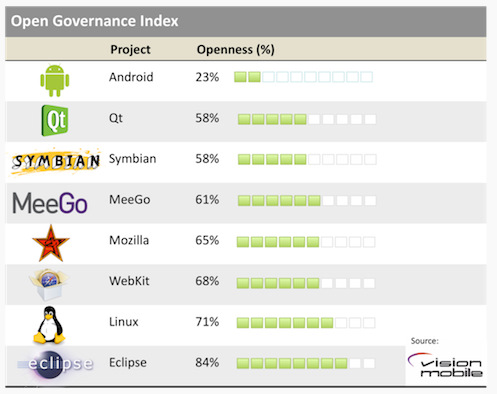Report: Open source Android mobile platform not very open at all

Android might be the envy of Google's mobile competitors, at least based on a letter penned yesterday by the Goog's top lawyer.
But a new study shows that Android is the least open of all of the open source mobile platforms. Market research analyst firm VisionMobile recently published a new report in which it introduced the "Open Governance Index," described as a "new approach to measuring the 'openness' of software projects."
VisionMobile studied and tracked the following eight open source mobile platforms over a period of six months: Android, MeeGo, Linux, Qt, WebKit, Mozilla, Eclipse and Symbian. To test just how open these open source platforms are, VisionMobile outlined a variety of metrics based on these four pillars:
1. Access: availability of the latest source code, developer support mechanisms, public roadmap, and transparency of decision-making 2. Development: the ability of developers to influence the content and direction of the project 3. Derivatives: the ability for developers to create and distribute derivatives of the source code in the form of spin-off projects, handsets or applications. 4. Community: a community structure that does not discriminate between developers
Based on the graphic below, it's quite easy to see how far behind Android placed against its competitors.
While it looks like a disappointment, Liz Laffan, a research partner at VisionMobile, wrote that perhaps being open source doesn't really matter as much to Android's success:
Android would not have risen to its current ubiquity were it not for Google’s financial muscle and famed engineering team. More importantly, Google has made Android available at zero cost, since Google’s core business is not software or search, but driving eyeballs to ads. As is now well understood, Google’s strategy has been to subsidise Android such that it can deliver cheap handsets and low-cost wireless Internet access in order to drive more eyeballs to Google’s ad inventory.
Yet, VisionMobile still asserted that its "research suggests that platforms that are most open will be most successful in the long-term." So maybe we'll start seeing Eclipse on more mobile devices in the near future?
[via Ars Technica]
Related:
- Apple vs. Android: The way it may go down
- Android vs. Apple and the state of smartphone industry: 4 takeaways
- Android Trojan records conversations, can send them to bad guys
- Android developer calls Amazon App Store "Rotten to the core"
- Sun CEO explicitly endorsed Java's use in Android: What do you say now Oracle?
